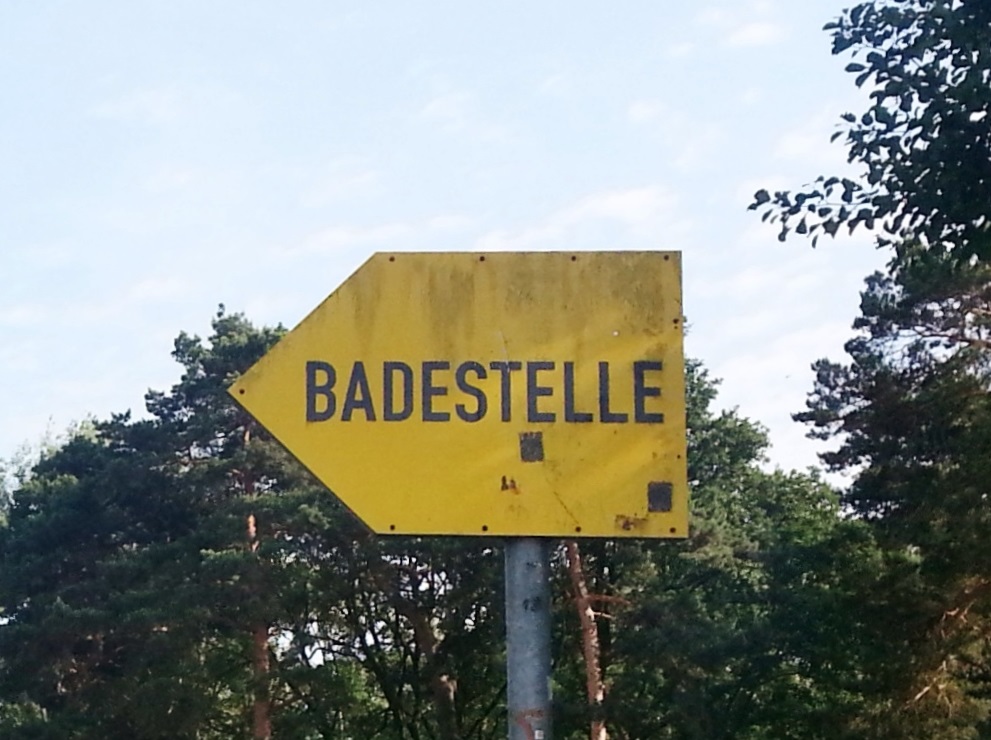The Schrebergarten Diaries // One girl’s adventures in Berlin-style urban gardening


I am the proud owner of a Schrebergarten, a.k.a. a Kleingarten–you know, one of those expanses of fenced-in gardens you’ve most likely seen from the S-Bahn. The English translation of the word, allotment garden, doesn’t really do the concept of Schrebergarten-ing justice. For there is so much culture and tradition and politics behind these little parcels of pastoral bliss. If there’s one thing that’s become clear to me over the two and a half years I’ve had the garden (other than the fact that gardening is hard and nature is a bastard), it’s that there is plenty of curiosity and confusion about these gardens, in both expat and native-German circles. Without further ado, my rebuttal of the three most common Schrebergarten myths I’ve encountered.
Myth #1: A Schrebergarten is really hard to get.
Truth: As long as you’re not too picky about location, and, to a certain extent, price, it doesn’t necessarily have to take long. I got mine because a friend of a friend was giving hers up, but I know several people who have applied the traditional way and gotten garden offers within a couple months. First, you fill out an application at your district’s Bezirksverband, specifying location preference and budget. Once any suitable gardens become available, you get sent an offer by post with a time window to respond. There are the usual bureaucratic hoops, but in my experience, it was pretty straightforward. Keep in mind the biggest colonies are located where there was once lots of disused land. If you want a cute little garden by your house in the heart of Kreuzkölln, for example–good luck. But just a little further east in Treptow (where my garden is) are plenty of gardens with short waiting lists.
Also, the average age of a Schrebergarten owner is 102 (my estimation) and, well, they’re dying off. I get a monthly Gartenfreunde digest in the mail and the death announcements can run multiple pages. So gardens are freeing up all the time.
Myth #2: Garden colonies are terrifying quasi-fascist regimes in which every last blade of grass must conform to a list of impossible rules. Violators will be shot at dawn.
Truth: There are some basic rules that can be annoying, but are not that hard to follow. They are: keep hedges trimmed to eye level, and, for the love of God, if you know what’s good for you, obey the sacred Ruhezeiten, the quiet times. That means no machinery and no audible music between 13.00-15.00 on weekday afternoons, after 19.00 on weeknights, and after 13.00 on Saturdays. All of Sunday is a Ruhezeit day. Your garden neighbours are old, and even the nicest Oma will get downright nasty if your hedge clippers disturb her afternoon siesta. The big, over-arching rules are dictated from up high, by the Bundeskleingartengesetz (national law on allotment gardens). The main ones are: Gardens cannot be a permanent residence. Gardens cannot be used for commercial purposes. Buildings cannot exceed 24 square meters. And at least one-third of the land must be used for growing fruits and vegetables.
Myth #3: Garden colonies are the epitome of Spießigkeit.
Truth: Spießig = petty, narrow, stuffy, small-minded, bourgeois. This myth is hard-held by many Germans that I meet, who I guess grew up watching their grandparents’ generation small-mindedly obsess over their roses and their lawns. I think there’s a difference between North America and Germany when it comes to public vs. private space. In North American cities, it’s long been the norm that private backyards are bigger and public parks are much smaller; here, the opposite is true (and in Berlin, few people have yards anyway). I think this contributes to the German mentality that fencing off your own piece of green space is small-minded and petty, perhaps even antisocial in a way.
From what I’ve been told, garden colonies in the former West tend to be a lot more prissy and perfectionist. A friend told me that her dad’s garden colony had a public blackboard on which all the gardens were snarkily ranked (his was always dead last). My garden colony is in the former East and is still very, very Ossi (many of my neighbours have been there since the 1970s or earlier). And maybe I’d have to be German to really understand Spießigkeit when I see it, but I don’t get that vibe from my colony, where the main priorities in life are not perfect roses, but sun, beer, the aforementioned Ruhezeiten, and the victory of the Hertha BSC football team.
Any more questions about Berlin urban gardening? Just post a comment below.




multikulinaria
June 17, 2013*lol* I’m German and never wanted a Schrebergarten, since it ties one in too much. Besides, I did indeed think beeing a ‘Laubenpieper’ quite spießig. You were absolutely right about all 3 myths. But the mindset is changing with time and I find myself considering getting a Schrebergarten now and then. Especially when my balcony herb and tomato garden reaches it’s capacity way too fast…
Hilda
June 17, 2013Yep, the mindset is slowly but surely changing. Since last summer, our new neighbours on one side are a group of 20- and 30-something friends, most of them German. They’re much more into growing veggies than roses.
RadiantFlux
June 17, 2013great article. I have always been put off by the perceptions of (1) long waiting times; (2) dictatorial neighbours; (3) the shear amount of work needed to upkeep the garden.
You’ve answered 1 and 2, but I am still not sure about 3.
Hilda
June 17, 2013We have grumpy neighbours on one side; amazing neighbours on the other. ‘Tis the luck of the draw, really. As for the amount of work, I can’t say it’s easy, but it doesn’t have to be overwhelming, either… depends on how ambitious and/or perfectionist you are!
Meshell
June 19, 2013Great article!
Sylee
June 19, 2013I’m already looking forward to the next installment from the garden!
Hilda
June 26, 2013And I am looking forward to hosting you at the garden very soon!
媽媽
July 5, 2013I like your pictures. Makes me want to go over and taste those red currents (?) and play with Ricky. Great article.
Rebecca
August 23, 2013Love this post! I was intrigued with these gardens when I arrived 5 years ago and was always met with looks of horror when expressing that to German friends. As I’ve walked through the large colony close to my flat these last couple of years, I’ve noticed more and more young people digging in the dirt…so it does seem that folks are finally coming around to having a garden in the city. Yay!
Hilda
October 3, 2013Hi Rebecca, sorry I missed your comment until now. There are slowly but surely more young people taking on Schrebergartens. Though I must say there’s good reason to do it when you’re retired and have a lot of free time on your hands — gardening is a lot of work!
Molly
May 10, 2016Thanks for this article!
This may be too late, but I am really interested in taking on a Schrebergarten (I’m an American in Cologne). I have a couple questions, though…
First, do you have electricity at yours? If not, how do you deal with it? I’ve read that some people use solar panels, but I don’t really know how much that entails cost-wise and work-wise. Mostly worried about how to keep the beer cold!
Second, did you have to pay for your garden in cash up front? I know they cost a few thousand but I don’t really understand how that works (if, once one suddenly becomes available do you need to be able to drop 5000 euro cash to secure it?).
Lastly, I can imagine it’s a lot of work. What’s a realistic time commitment I should have in mind (only want to start with very, very basic gardening).
Sorry if this is too much, just very curious to hear your perspective!
Lenara
May 18, 2016Hi Molly, I am also in the process of getting a garden.
Some gardens have electricity, some don’t, so better ask. And while the land is rented, the house on top of it is considered private property (as well as the trees!) so the cost will depend on these, which you will have to buy from the previous owner. I don’t know if they provide installment payments but most likely not I think…
With luck you can find one that is not so expensive… but of course if it’s really cheap it might be because it’s in a bad shape and then all of a sudden besides planting vegetables you will need to fix the roof… 🙂
I can’t say much about time commitment because I haven’t started yet, but what I did already was to enlist some friends from my neighborhood who want to help and share the work (and the fun).
Molly
May 21, 2016Thanks for the insight!
Did you get a garden or are you still on a list?
I’ve found the whole process (at least with the ones we’ve looked at) to be very old fashioned. Once you’ve applied, instead of calling you when one is available they kind of expect you to keep checking in in person. So I don’t really know what to expect as far as to when we will get an offer! If you’ve gotten one, how long did you have to wait?
Also curious to know how you do it without electricity (if you have one without).
Thanks again for your reply!
Lenara
May 23, 2016It’s hard to answer about waiting times because things can be very different from garden to garden. Keep applying and checking! Don’t give up.
If the garden does not have electricity you have to be creative. Think a hole in the ground instead of a fridge. If you research how people used to do things before electricity pretty nice and easy alternatives come up actually.
We are getting a garden with electricty but have friends who don’t have and this is what they do.
Good luck!
Hilda
May 24, 2016Hi Molly,
Sorry for the late reply! To answer your original questions, yes, my garden has electricity and I personally wouldn’t consider one without. Having a fridge, not to mention light, in my garden hut is important to me, especially when you consider than in spring and fall, it gets dark pretty early. Also, important gardening appliances like hedge trimmers and lawn mowers need electricity, too.
You do have to pay cash, in full, once you sign your garden contract. If and when you give up the garden, you will get your money back when somebody else takes over the garden. Keep in mind that the value of each garden is accessed by the Kleingarten association, and it’s possible that the value may depreciate, so if you get rid of your garden in many years’ time, you may get back somewhat less than you originally paid for it. If you put upgrades into your garden house, though, increasing its value, the opposite would apply.
Re: commitment, I’d say you should expect to put in at least a couple hours a week for basic maintenance (hedge trimming, lawn mowing, light pruning and weeding). If you want to grow a lot of vegetables, then that would take more time.
Good luck!
Society Beta
March 7, 2018Hi Hilda,
I lived in Berlin from 2007-13 and always wondered about these. I’ve always had the impression that people live in their garden huts permanently. How long per year do most people stay and whats the definition of a permanent residence? I’m very interested in the model. Do you know if new garden villages ever open?
Thanks, Kelly
Hilda
March 7, 2018Hi Kelly,
The law (there actually is a Bundeskleingartengesetz!) just says a garden hut cannot be used as the place for the (mandatory) registration of one’s residential address. It would be very difficult to live there year ’round anyway, as the water mains get shut off from November-March because of the risk of freezing. To answer your last question, within the city of Berlin I doubt new garden colonies are opening anymore these days — in fact it’s probably the opposite. Various garden colonies have been evicted in recent years due to selling off of the land to the city, and to real estate developers.